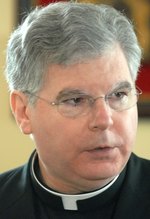By George Graham
The Republican
August 31, 2009
http://www.masslive.com/news/index.ssf/2009/08/planned_church_closings_averts.html
SPRINGFIELD - The closing and merging of parishes within the Roman Catholic Diocese of Springfield - painful as it is to ponder and undertake - averts what would have a "slow trickle of parish by parish failings," diocesan officials said Monday morning.
The diocese announced Saturday that 14 parishes will be closed by the end of the year with cities like Chicopee and Northampton being hardest hit.
Monsignor John J. Bonzagni, director of pastoral planning for the diocese, said Monday that should the diocese have done nothing, such things as outreach services and religious education would have been curtailed.
"It would have been a slow death," Bonzagni said. "We decided to end that uncertainty and put things on a firm footing."
Diocesan spokesman Mark E. Dupont has said there are 101 parishes in Western Massachusetts and an estimated 220,000 Catholics. There were three times that 50 years ago, according to diocese officials.
 |
| John J. Bonzagni |
Bonzagni and others, speaking at a press conference Monday, stressed that the four-year process, undertaken by the Diocesan Pastoral and Planning Committee, was transparent and fair.
"No parish should feel exempt from this process," Bonzagni said.
Springfield resident Richard E. Butler, chairman of the 12-member committee, acknowledge the pain that comes with the news. He said, however, he believes the majority of those affected realize "that this had to happen. ... Things do change and we are just catching up to things that have been changing for 50 years."
Bonzagni said the committee, which had representation throughout the diocese, made all its decisions by consensus. "We never took a vote," he said.
"It was a very informative process," committee member Angel L. Delgado of Westfield said. "I hope we can now come together more as a Catholic community."
Bonzagni, asked about churches to be closed that have made investments to their infrastructures in recent years, said they did so knowingly at their own peril.
Bonzagni said that The Most Rev. Timothy A. McDonnell, bishop of the diocese put a moratorium on all but the most pressing building projects but "some places, against our advice, went ahead."
"Some parishes said, 'You can't close me now, we just tarred the driveway,'" Bonzagni said, speaking hypothetically.
"No," Bonzagni said to that hypothetical example. "We are considering location first."
Bonzagni said proceeds from any property sales will go to the parish that absorbed the defunct church, unless that parish is in debt to the diocese.
Groups have the option of contesting the diocese's plan by appealing directly to the Congregation for the Clergy in Rome.
Bonzagni stressed, however, that he is not aware of any successful appeals in such matters.
"Usually, all Rome is interested in is the process," Bonzagni said. "They just want to know that canon law has been followed."
Bonzagni said the committee's process, meanwhile has been "pretty solid. ... People can claim a lot of things and when you get to an appeal process, you have to prove these things."
Groups seeking to appeal typically hire a canon lawyer in Rome to shepherd them through the process, Bonzagni said.
Dupont said there is a fear of "interlopers coming in and misleading our people" regarding the appeals process and the likelihood of success.
Any original material on these pages is copyright © BishopAccountability.org 2004. Reproduce freely with attribution.